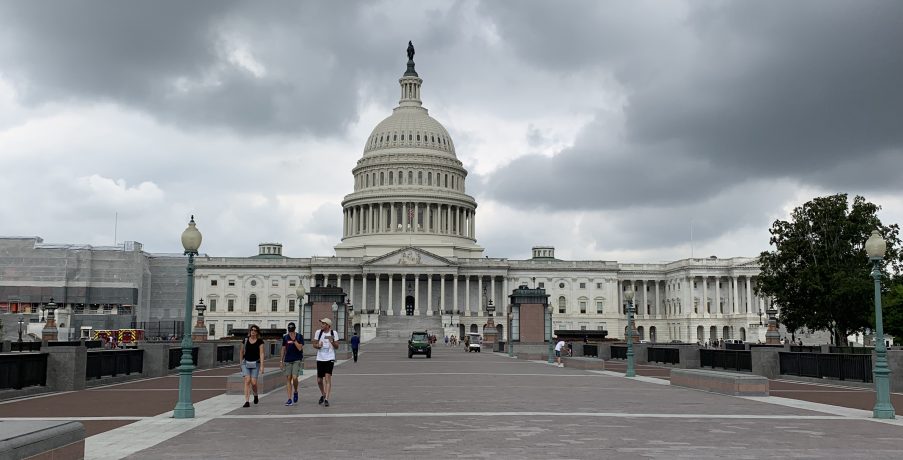
-
Small Business Spotlight: Biggest Financial Pitfalls to Avoid in 2022
Post Views: 578By Joe Connolly and Neil A. Carousso
NEW YORK (WCBS 880) — Mistakes can be costly, especially during such an uncertain time.
On the WCBS Small Business Spotlight, sponsored by Dime Community Bank, Joe Connolly and Neil A. Carousso talked to Jean Chatzky, an award-winning financial journalist and CEO of HerMoney Media, Inc., who shared some of the most common mistakes business owners make and new businesspeople should avoid.
1. Not Enough Working Capital
Chatzky says a common mistake new business owners make is failing to plan for how much capital they need beyond getting started.
“Particularly right now with so many people joining the great resignation, leaving their workplaces, we’ve seen a lot of people, particularly women, launch businesses, hang out a shingle, take their skills, and try to turn it into a revenue stream for themselves,” she said, continuing, “If you could do it with a client or two under your belt, that’s fantastic, but you need to also understand what it’s going to cost you not just to get going but to keep going as you gain some ground.”
Chatzky advises business owners to plan for enough working capital to see some success. She also tells budding entrepreneurs to pay close attention to what people tell them that they are good at and pursue an area where they can charge for their skills.
The so-called “great resignation,” she alluded to, is putting pressure on the most hard-hit industries struggling to recover from the pandemic. A record 4.5 million Americans quit their jobs in November, according to the U.S. Bureau of Labor Statistics. Workers in the hospitality industry were most likely to leave for higher paying jobs.
Chatzky said preventing costly turnover comes down to managing relationships.
“If you’ve got people on your team that you want to help grow, that you want to encourage to grow, you need to know what they want, right? If you’re not asking them what they want, then they’re going to look for what they want elsewhere,” she said.
2. Operating Too Big
“You got to be scrappy, especially when you’re bootstrapping,” said Chatzky.
The financial expert recalled an instance early on at HerMoney Media, which Chatzy co-founded in 2018, when a client left a big investment bank to start his own company.
“He wanted to do some focus grouping,” she said. “His idea was, ‘Well, you hire a focus group company.’ And, my idea, was, ‘No, you send out some feelers through your social channels and your newsletter and you ask people to show up for a Zoom call that costs you nothing.'”
The small business mindset will help owners and managers serve their customers and turn profits while operating lean.
3. Underestimating the Hiring Process
Chatzky explained on the Small Business Spotlight that business owners often underestimate the importance and difficulty of hiring.
“Realize what you can’t do. Realize what you’re not good at. And, as you start to bring in other people to support you whether they’re employees or contractors or freelancers, look for people who do those things better than you do. Don’t be threatened by the fact that they have skills that you don’t,” she said.
She told Connolly and Carousso that she hires people in their 20s for their social media skills. The HerMoney Media CEO recommends contracting out to potential employees for a period before putting them on payroll to see if they are a good fit for their company.
Despite all the challenges businesses face with the ongoing COVID threat, Chatzky believes business owners are more optimistic than most people.
“I think business owners have an inherent sense that this is going to work, that I can do this,” she said, adding, “They’re more confident in their own abilities. That can be good and that can be bad, right? If you’re overly confident, you can lead yourself astray, but I do think they’re different in that way. Some business owners just don’t want to work for anybody else. I think there’s definitely a breed like that; I think it’s a growing breed.”
She told WCBS 880 she sees her customers and her employees as her bosses. It helps keep her grounded and her firm growing.
Chatzky co-hosts a new national radio show with journalist Soledad O’Brien called “Everyday Wealth,” presented by Edelman Financial Engines.
“The listeners are anybody who is looking to make more of their money,” said Chatzky.
Everyday Wealth airs Sundays at 11 AM on WCBS Newsradio 880.
Watch Joe Connolly and Neil A. Carousso’s full conversation with Jean Chatzky on the Small Business Spotlight video above.
-
880 Weekly Rewind: Mayor Adams Unveils Plans to Jump-Start NYC’s Economy, Keep Schools Open
Post Views: 444Produced by Neil A. Carousso
NEW YORK (WCBS 880) — New York City Mayor Eric Adams had a busy first week in office that included a focus on the economy and schools as parents and kids returned to their routines following the holiday break.
https://omny.fm/shows/880-weekly-rewind/new-mayor-schools-struggle-with-covid-and-rememberMayor Adams discussed his plans to get the city’s economy moving again and his reasons for keeping kids in school on The 880 Weekly Rewind with Lynda Lopez.
Listen to The 880 Weekly Rewind Podcast for a deep dive into the top stories of the week, produced by Neil A. Carousso for WCBS-AM New York.
-
NYC Comes to Grips with New Normal, Changes Ahead for COVID-Battered Economy
Post Views: 627By Joe Connolly and Neil A. Carousso
NEW YORK (WCBS 880) — The changes brought on by COVID-19 are being cemented this year.
As cases and hospitalizations continue to soar amid a new wave fueled by the highly contagious Omicron variant, companies have been forced to nix plans to bring remote workers back to the office. The longer people work from home – some for nearly two years – the more difficult it will be to get them back into the workplace, said Kathryn S. Wylde, president and chief executive officer of the Partnership for New York City.
“It’s a big setback in the sense of the psychology more than the economy,” she said. “As long as people are functioning remotely and buying their stuff on the Internet rather than patronizing our local stores, we’re going to see a slowdown in the recovery of our brick-and-mortar economy.”
On the WCBS Small Business Spotlight, sponsored by Dime Community Bank, Wylde told Joe Connolly and Neil A. Carousso that employers are facing the reality that remote work is here to stay.
“Our survey says 80 percent of companies are looking at what’s called a hybrid work schedule where people will at least work two or three days in the office, the other days at home, and that’s going to be the new normal post-pandemic,” the business leader said.
She told WCBS 880 many younger people prefer working remotely, but they’re missing out on mentorship. Partnership for New York City members JP Morgan Chase & Co, Citigroup and Goldman Sachs have all continuously delayed their return to the office despite their leaders being staunch proponents of in-person work.
“We’ve had a Manhattan-centric economy for a very long time, at least since the 1970s,” said Wylde, noting a seismic shift in the local economy because of the pandemic.
As the head of the city’s foremost business group, Wylde has had numerous conversations with Mayor Eric Adams since being elected. Their professional relationship goes back years since Adams served in the NYPD, and later, Brooklyn Borough President. She told Connolly and Carousso the Adams Administration is considering new ways of spurring growth in neighborhoods outside Manhattan where people have been working from home.
“So, I think your point that we’re going to see business interests and real estate interests across the five boroughs actually benefit over the long-term of the de-concentration of economic activity across the city is very appropriate,” said Wylde.
The Partnership for New York City reports about 19 percent of Manhattan office towers are vacant. Wylde believes many of the old buildings will be torn down and replaced by residential apartments.
“There are a number of old buildings (in Midtown East) that don’t lend itself to residential conversation or any other conversation that will probably come down as you’re seeing happen with the RXR (Realty) project where they’ve taken down the Grand Hyatt and they’re going to rebuild a whole new setting that includes all these mixed-use and entertainment to retail as well as office structures,” she said, adding, “That’s going to be the plan of the future.”
New York City’s unemployment rate of 9 percent is more than double the national average of 4.2 percent. New York has added back a little more than half the jobs it lost in the pandemic, according to the U.S.
Bureau of Labor Statistics.“We still have 360,000 people who have lost their jobs during the COVID and may not be qualified – probably most are not qualified – for the available job openings,” said Wylde.
She told Connolly and Carousso that Mayor Adams has been all ears on solutions.
“Closing that skills gap is another priority he has, and rather than telling us how he’s going to do it, he’s asking us how we can do it together with employers, with entrepreneurs, how we can do this together.”
Wylde said on the Small Business Spotlight the mayor wants to start internships for high school students and improve job training for college students to get them jobs in their hometown.
The business group is also working with the city to connect small businesses with big corporations as clients.
“Individual businesses have their own set of procurement with small and minority-owned businesses, but often, if they’ve got somebody good, they don’t want to share them or that small business may not have access to the support and the financing they need to grow and serve more customers,” explained Wylde.
She is hopeful Mayor Adams and Gov. Kathy Hochul will see the value in unlocking city and state resources to help small businesses meet the demands of big companies as vendors.
“We have to organize it and create a system,” she said of the vetting process.
See more on the reshaping of New York City’s economy on the Small Business Spotlight video above.
-
New Scholarship Assists NY Students with Dream Internship on Capitol Hill
Post Views: 509By Neil A. Carousso
NEW YORK (WCBS 880) — New York college students can apply for the opportunity to work in Congress next semester.
A new scholarship will be awarded to State University of New York (SUNY) students who need financial support to intern in Washington. It is offered by the Former Administrative Assistant of the Year Award (affectionally called FAATY) in partnership with SUNY and the New York State Society.
2021 FAATY honoree Kevin Fogarty, former chief of staff to retired Rep. Peter King (R-NY) and co-founder of Ambrose Partners, told WCBS 880’s Neil A. Carousso the interns will have the opportunity to learn from veteran Capitol Hill staffers.
“This really gives these individuals an opportunity to see things that they normally would not do or be able to see,” Fogarty said. “It also allows them to create relationships not only with this office, but with other offices, and also with former chiefs of staff, too, who can help mentor these students and try to point them in the right direction for something they’re interested in.”
Interns will be assigned to an office of a member in the New York Congressional Delegation.
Fogarty invites SUNY students who are interested in learning more about the internship to contact him directly via Ambrose Partners’ website.
-
Decision Makers Exclusive: Marriott President Says ‘Bleisure’ is the Future of Travel
In Best Of, Featured, Guest, Interview, Latest, News Stories, Technology, The World, Top News, videosPost Views: 1,250Produced by Neil A. Carousso
NEW YORK (Bloomberg/1010 WINS) — While travel lovers may still have the COVID-19 pandemic blues, one hospitality industry leader recently joined 1010 WINS and Bloomberg to explain why the future of travel looks bright as we head into 2022.
Marriott International President Stephanie Linnartz told hosts Carol Massar and Larry Mullins in an exclusive Bloomberg/1010 WINS Decision Makers interview that “Bleisure,” or mixing business and leisure travel, is poised to be the future of the industry.
“I’m more bullish about the future of travel and my company than I’ve ever been,” she said.
Near the start of the pandemic in April 2020, Marriott – a hospitality company that operated 2,149 properties as of the end of last year, including JW Marriott, The Ritz-Carlton, St. Regis and W Hotels – saw business drop by 90 percent. Lockdowns and travel restrictions severely curtailed travel around the globe.
Since most of the company’s employees work on-site, around 80 percent were furloughed, laid off or lost their jobs when the pandemic hit and 25 percent of Marriott’s hotels were closed.
“It was really the most unprecedented, devastating event to ever hit our industry and other related industries,” said Linnartz, who has been with the company for 24 years.
However, she said the company worked quickly and creatively to adapt. When travel was restricted, this often meant entering the Marriott Bonvoy brand into partnerships with companies such as UberEats.
Now that travel has opened up more, Linnartz said she can see people eager to hit the road more than ever.
“We have really entered into a phase of recovery in the travel business,” Linnartz told WINS and Bloomberg. “I really think that travel is part of the human condition,” she added.
With the pandemic, the hotel experience has also changed, Linnartz said. Heightened cleanliness procedures and more features, such as check ins and room service, are offered via mobile devices.
“That’s something I think that’s going to stick,” said Linnartz of the technological advances spurred by COVID-19. Yet, she said it won’t replace the “human element” necessary to make travel great.
Going forward, the company is also planning to focus on some initiatives launched before the pandemic: becoming more environmentally friendly as well as offering high-end rental properties and yachts.
In 2019, Marriott International announced it would replace single-use toiletry bottles of shampoo, conditioner and bath gel in guestroom showers with larger, pump-topped bottles to reduce landfill waste. As of that August, the larger bottles were already in use at around 1,000 North American properties.
Another project from 2019 is the Marriott rental property program. Unlike other similar services offered by companies like Airbnb, Marriot properties are only premium or luxury, with high standards for amenities. Since the program started, offerings have grown from 2,000 properties to around 50,000.
“Things are moving in the right direction,” she said. “Travel is coming back in a major way.”
A remaining challenge for the industry has been finding staff amid a labor shortage, but Linnartz said Marriot’s commitment to a solid work culture and offering opportunities for advancement has helped prevent high turnover.
“Our culture at Marriott has always been our secret sauce,” she said.
“When you had a job at a place like that, you know, you were big stuff in the neighborhood you had a pride in doing that,” said Mullins, reminiscing about his time as a Marriott employee in Orlando, Fla.
As Marriott continues to look for ways to make work experiences for its associates positive and shaped to today’s challenges, Linnartz can also see how new, flexible work schedules in other industries are impacting the travel business.
“Bleisure,” is growing because people can work remote and take longer vacations, she explained.
Another challenge for the travel industry is the recent surge in omicron variant COVID-19 cases, which has set off mask mandates in the U.S. as well as some international travel restrictions.
Now that Marriott has weathered one part of the pandemic storm, Linnartz has high hopes for the future.
“From crisis comes creativity,” she said.
Decision Makers is a joint production from Bloomberg and Audacy – the parent company of 1010 WINS. It is produced by Neil A. Carousso.
Guest
Social Feeds

VIDEO: Told the airline to book us on the next flight out (SPONTANEOUS TRIP!)

VIDEO: The Taylor Swift Effect | WCBS Business Breakfast

VIDEO: Future of NYC | WCBS Business Breakfast

VIDEO: Reasons for New Yorkers to be Optimistic | WCBS Business Breakfast

VIDEO: NYC's AI Chatbot | WCBS Business Breakfast






